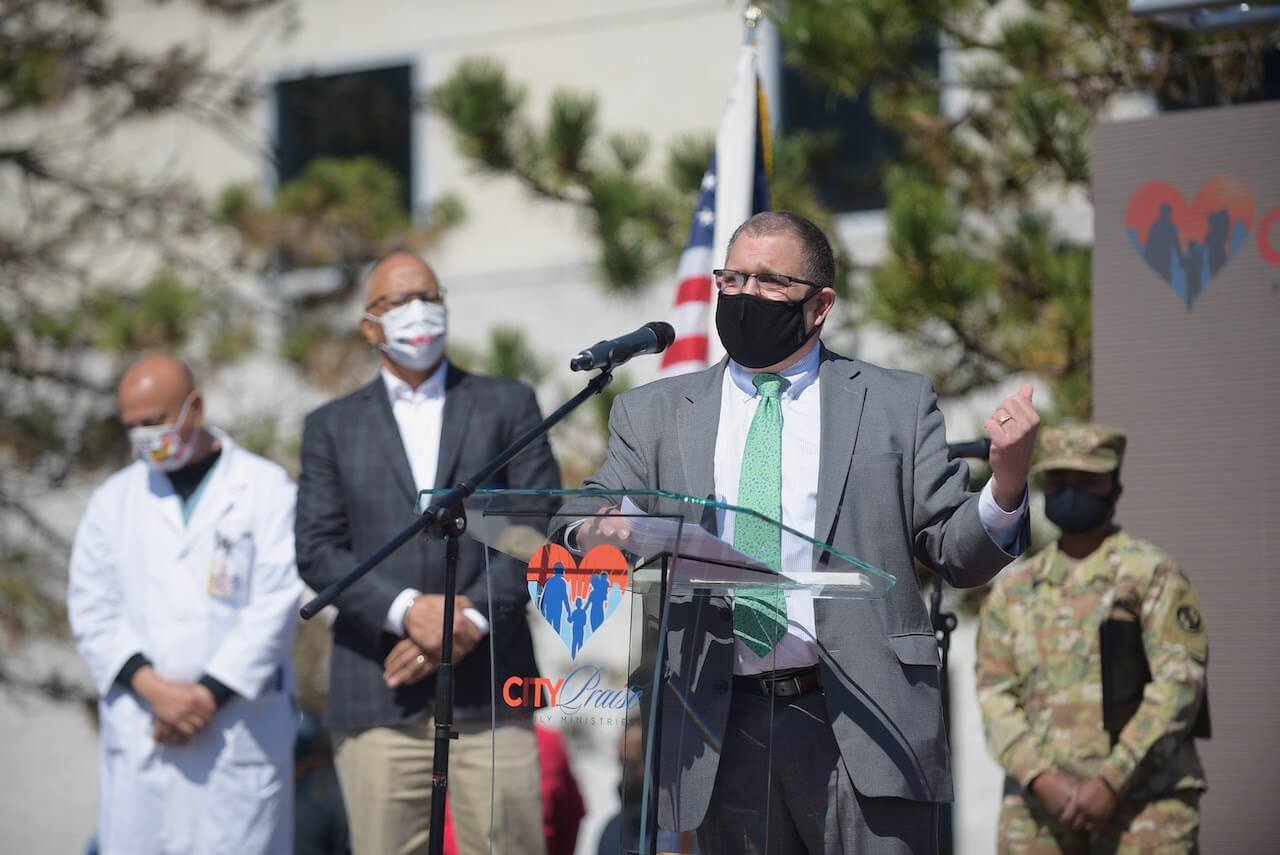Analysis: Why Dennis Schrader Sailed Through His Senate Confirmation

The state senators who expressed ambivalence about the nomination of Dennis R. Schrader to be Maryland’s secretary of Health on Friday were, in many respects, mirroring the public’s mixed feelings about his agency’s most high-profile task — the distribution of COVID-19 vaccine.
A Goucher College survey released in March revealed a significant, and seemingly-contradictory, split in public opinion.
That survey was in the field in February, during the early weeks of the distribution campaign, when appointments were hard to come by — and when local health and political leaders, and state lawmakers, were heaping scorn on the administration.
A huge portion of the electorate — 76% — said they approved of the job Gov. Lawrence J. Hogan Jr. (R) has done in handling the COVID-19 outbreak, with 35% saying they “strongly” approved.
But nearly as many — 66% — said that Maryland was doing only a fair or poor job of distributing the vaccine. Only 25% described the state’s response as good, and just 7% called it excellent.
Dissatisfaction with the rollout was remarkably bipartisan, with 73% of Republicans and 62% of Democrats calling it fair or poor.
Hogan’s ability to maintain historically-high job approval rankings despite the bumpy rollout of a high-profile initiative reflects how settled the public’s view of the second-term governor is.
It also complicated matters for members of the Senate, who had to decide on Friday whether to confirm Schrader, who had served as acting secretary since early December — and whose nomination to be secretary the first time, in 2017, became tangled in a political dispute between Hogan and Democratic leaders in the legislature.
Despite media speculation to the contrary, it became clear a few weeks ago that Schrader was almost certain to be confirmed, despite the negative headlines the vaccine program was generating.
Several factors weighed in his favor:
A willingness to talk — Frustration with the state’s vaccination program has been broad.
Critics felt the agency didn’t use the months of lead time it had to plan a coherent strategy. The state seemed reactive — rather than proactive — to concerns that many low-income residents and seniors lacked internet savvy, transportation and the gobs of free time needed to surf the Web for appointments.
Top local health officials — many of whom are technically state employees — learned of major policy announcements via press release when the public did, another bad optic.
And, the state created a single pre-registration system only after officials at every level of government begged Hogan and Schrader for weeks to do so.
Despite all this, Schrader kept his commitment to appear, each week, before the Senate Vaccine Work Group. The data presented by the legislature’s analyst at the start of those meetings showcased the state’s ongoing challenges, and the questions the health chief fielded were frequently rough.
It would have been easy for Schrader to start finding reasons to skip the hour-long grillings, but he didn’t. And senators (including many who were tough on him) cited his willingness to engage and his openness to suggestion in voting to confirm.
Mass vaccination sites — Critics have hammered the Department of Health for the racial gap in the vaccination program. But the administration was savvy enough to locate the first four mass-vaccination sites — two in Baltimore City and others in Prince George’s and Charles counties — in majority-Black jurisdictions.
Those sites and the Hogan administration’s creation of an equity task force on vaccines — combined with whatever role vaccine hesitancy played — may have softened some of the anger directed toward Schrader and his team.
You break-it, you-bought-it — If the Senate had rejected Schrader’s nomination, Hogan would have been forced to find someone else. Who would he get to parachute into an agency battling a pandemic 21 months before he leaves office? Who knows?
As every professional sports general manager knows, firing the coach is the easy part.
Bottom line: If the Schrader replacement stumbled, Hogan would be quick to blame the legislature for creating chaos. As is stands now, the governor got his man — and whatever happens going forward, good or bad, it’s on them.
Don’t step on the message — One week from now, barring the unexpected, legislative leaders will boast that the 2021 General Assembly session was a massive success.
The COVID-19 safety protocols they put into place worked, keeping the virus from forcing an early end to the legislative session.
They deployed technology to make the workings of the General Assembly more open than ever.
And numerous thorny issues — police reform, funding for Maryland’s HBCUs, how to use federal COVID relief funds and others — have been resolved or are close to being resolved, often in a bipartisan manner.
A fight over Schrader, which Hogan would have cast as partisan, needlessly would have stepped on what is shaping up to be a positive post-session message.
There are other issues — While the vaccine rollout is the most high-profile task before any state agency at this moment, the focus will eventually shift to other issues. Maryland has a unique and complicated relationship with the federal government when it comes to heath care financing, and Schrader is an expert in it. Lawmakers recognized that giving him the boot now would be unwise.
Fatigue — Lawmakers are exhausted from three months of Zoom meetings and a session that has featured all the work, and none of the fun, of a regular year. They want to go home. While several members of the Senate spoke passionately against Schrader’s confirmation, no one else had the stomach for a pitched battle near the finish line.
More vaccines are coming — Whatever failings the state’s vaccine rollout has had, Maryland is poised to be awash in supply. Memories are short, and in due time people will focus on other things.




 Creative Commons Attribution
Creative Commons Attribution